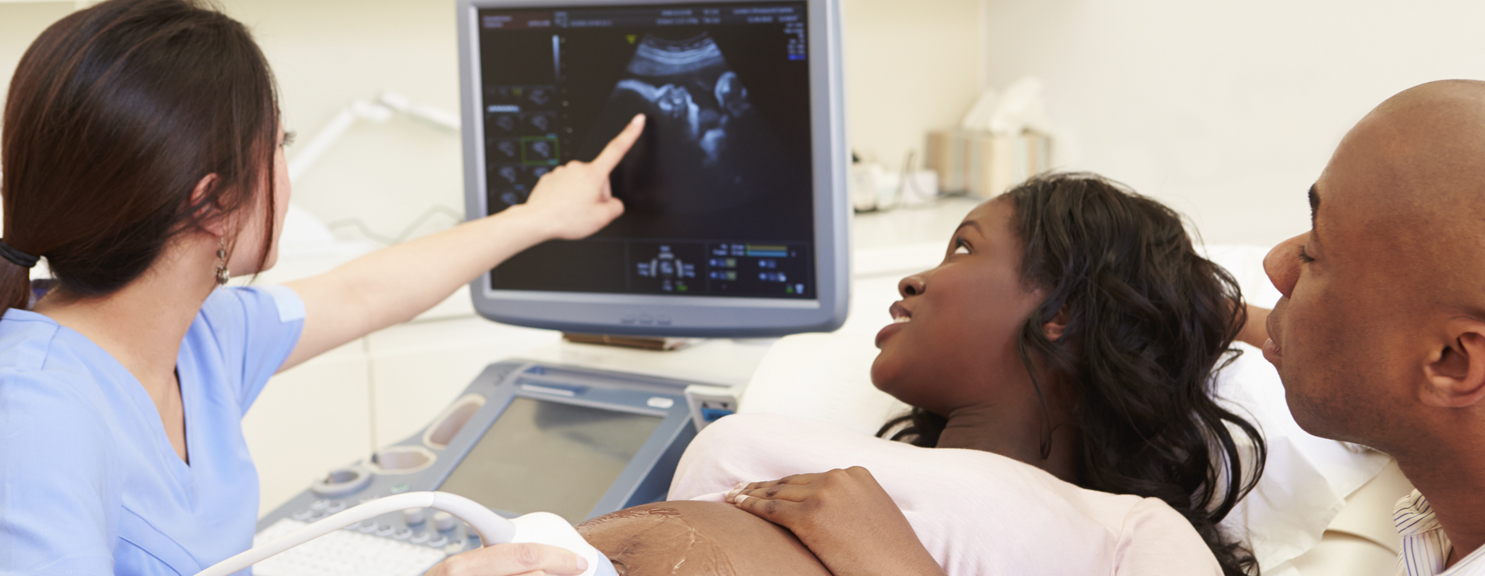What Do Diagnostic Medical Sonographers Do?
Diagnostic Medical Sonographers (DMSs), also known as ultrasonographers or sonographers, use special equipment that directs high frequency sound waves into a patient’s body to collect images for interpretation by physicians to assess and diagnose various medical conditions (procedures commonly known as ultrasounds, sonograms, or echocardiograms).
This diagnostic medical procedure can be used to examine the abdomen, breasts, female reproductive system, prostate, heart, and blood vessels. Sonography is increasingly being used in the detection and treatment of heart disease, heart attack, and vascular disease that can lead to strokes. Specialization in gynecologic sonography, abdominal sonography, neurosonography, and ophthalmologic sonography is common in the profession.
Unlike x-rays, sonography is a radiation-free imaging modality. Although most ultrasound procedures are non-invasive, invasive ultrasound procedures are becoming more frequently used with the development of new technology.
For more information about DMSs, click here.
Where Do Diagnostic Medical Sonographers Work?
The majority of all DMSs are employed in hospitals. Some DMSs work in physicians’ offices and clinics, particularly diagnostic imaging centers and offices specializing in obstetrics. DMSs are also employed in medical and dental laboratories. Also, some DMSs work in federal or local government and offices of non-physician health practitioners and allied health professionals.
How Much Do Diagnostic Medical Sonographers Earn?
In 2022, the average annual income reported by the Bureau of Labor Statistics (BLS) for diagnostic medical sonographers in the United States was $84,410. The New York State Department of Labor (NYSDOL) reports that, in 2023, diagnostic medical sonographers in New York earned a median annual salary of $89,277 (diagnostic medial sonographers in the 25th percentile made approximately $74,705 while those in the 75th percentile made approximately $101,809).
Supply and Demand
As ultrasound technology evolves, it will become a more and more common method used to assist in diagnosing medical conditions, favored over more invasive procedures. As a result, the number of DMS jobs is expected to grow much faster than the average for all occupations. The Bureau of Labor Statistics projects that the number of jobs for diagnostic medical sonographers and cardiovascular technologists and technicians in the U.S. will increase by 10% between 2021 and 2031. The New York State Department of Labor projects that the number of jobs for diagnostic medical sonographers in the state will increase by 29% between 2020 and 2030.
For more information on the need for DMSs by New York State labor regions, 2018-2028, click here.
New York Educational Requirements
DMSs usually have an associate degree or a four-year bachelor’s degree and programs are available through colleges and universities. Some sonographers train in vocational-technical schools, hospital training programs, or the Armed Forces. Many employers prefer a degree or certificate from an accredited institute or hospital program. The accredited programs usually follow a specific course of study and include clinical training. Course work may include classes in anatomy, physiology, instrumentation, basic physics, mathematics, patient care, and medical ethics. These programs also include courses in medical terminology and interpreting sonographic images.
New York Licensure Requirements
New York does not require DMSs to be licensed. Individuals wishing to demonstrate proficiency in their occupation may receive certification through national organizations such as the American Registry of Diagnostic Medical Sonographers (ARDMS), http://www.ardms.org. ARDMS certification is also available in specialty areas within sonography.
Financial Support
Although specialized scholarships for diagnostic medical sonographers are not widely available, students seeking an education in sonography can apply for financial aid through a number of state and Federal aid programs. More information about student aid is available at: www.https://www.hesc.ny.gov/pay-for-college/apply-for-financial-aid/apply-for-aid-start-here.
Education Programs in New York (subject to change)
| Hudson Valley Community College 80 Vanderburgh Avenue Troy, NY 12180 (518) 629-4822 |
Long Island University Brooklyn Campus 1 University Plaza Brooklyn, New York 11201 (718) 488-1011 |
| Rochester Institute of Technology One Lomb Memorial Drive Rochester, NY 14623 (585) 475-2411 |
SUNY Downstate College of Health Related Professions 450 Clarkson Ave Brooklyn, NY 11203 (718) 270-1000 |
| Western Suffolk BOCES 152 Laurel Hill Rd Northport, NY 11768 (631) 261-3600 |
Trocaire College 360 Choate Avenue Buffalo, NY 14220 (716) 826-1200 |
| SUNY Upstate Medical University College of Health Professions 750 East Adams St Syracuse, NY 13210 (315) 464-5540 |
Hunter Business School Suffolk Campus 3247 Route 112 Medford, NY 11763 (631) 736-7360 |
| Center for Allied Health Education 1401 Kings Highway Brooklyn, NY 11229 (718) 645-3500 |
Alfred State College of Tech 10 Upper College Dr Alfred, NY 14802 (800) 425-3733 |
| NY Medical Career Training Center 36-09 Main Street Flushing, NY 11354 (718)460-1717 |
The CURE Center for Ultrasound Research & Education 333 Westchester Ave White Plains, NY 10604 (855) 843-2873 |
Additional Web Links
For more information on medical sonographers, go to the Society of Diagnostic Medical Sonography website at: http://www.sdms.org/.
[whohit]Diagnostic Medical Sonographers[/whohit]

